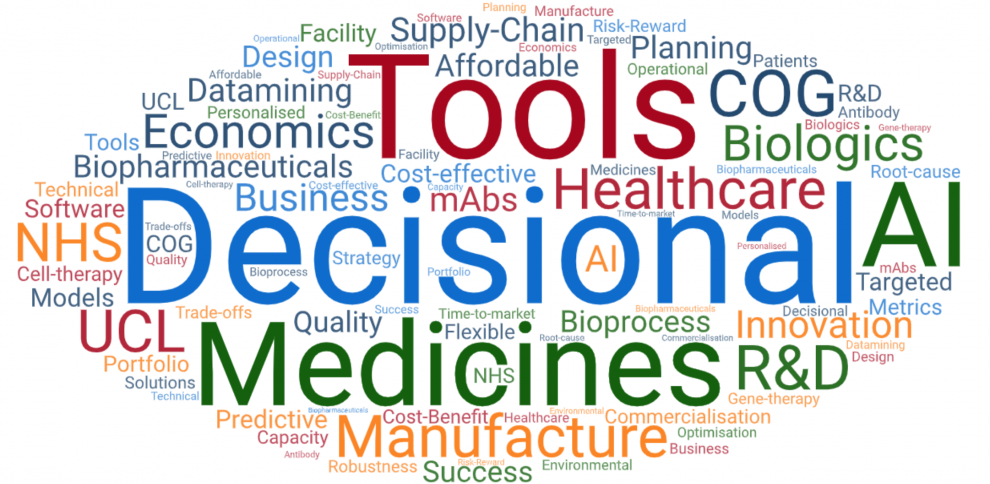UCL’s Bioprocess Decisional Tools research has developed multiple tools to enhance and streamline critical business decisions for research and development and commercial drug manufacturing operations
What is the scope of UCL’s Decisional Tools?

The Decisional Tools comprise a set of proprietary algorithms and software solutions that enable full integration of business and process models to facilitate cost-effective bioprocess design, capacity planning, and R&D portfolio management through to root cause analysis and manufacturability assessments. The Decisional Tools allow rigorous investigation of biopharmaceutical investment decisions through the creation and integration of a broad range of algorithms, namely: process economics, dynamic simulation, risk analysis, multi-criteria decision making, multi-objective optimisation and datamining. The ultimate aim of these tools is to improve decision-making during drug development and hence reduce time and costs.
How do UCL’s Decisional Tools help biotech companies?
UCL’s Decisional Tools have now been used by more than 25 global biotech companies to gain a greater understanding of the impact of critical decisions on key financial, operational and risk metrics.
UCL’s Decisional Tools act as a testbed for the evaluation of alternatives and hence significantly shorten the time required to prioritise cost-effective manufacturing and process development strategies to cope with future trends. Effective use of the modelling outcomes can highlight critical experiments to perform and obviate the need for extensive pilot-scale trials. This is critical to accelerating process development, reducing costly experimentation and ultimately delivering affordable medicines.
For example, one leading manufacturer of novel antibody-based therapeutics used the outcomes of UCL’s Decisional Tools to focus their process development resources onto the most attractive strategies for further experimental verification, saving time and reducing costly experimentation. These outcomes enable faster time-to-market that can mean the difference between a blockbuster drug and one that barely makes a profitable return on the investment in its development. Additionally the application of the software led to a six-month reduction in development time for a new product. The value of this in sales revenue was estimated to be at least $50 to $100 million.
The tools have also helped a pharmaceutical innovator to prioritise capacity sourcing decisions and helped them decide when they will need extra capacity and whether to build internally or source capacity from contract manufacturers.
The datamining component of UCL’s Decisional Tools have helped a global biopharmaceutical innovator to identify the key performance drivers influencing product quality on a novel therapeutic protein. The outcomes from this research led to the design of alternative scale-up strategies to minimise product heterogeneity during manufacturing.
UCL’s Decisional Tools also forms part of UCL's Masters-level MBI training courses attended by senior industrialists from leading companies worldwide.
What are example applications of UCL’s Decisional Tools?
These tools have been applied to strategic decisions in the development and manufacture of biopharmaceuticals such as monoclonal antibodies (mAbs), vaccines and cell and gene therapies (e.g. MSCs, CAR T-cells). These decisions are at the process and enterprise level.
On the mAb front, examples of strategic decisions tackled include
- batch versus continuous manufacture for mAbs
- in-house versus contract manufacturing decisions
- factory floor scheduling
- facility fit prediction
- root cause analysis of deviations in critical quality attributes (CQAs)
On the cell and gene therapy front, examples of strategic decisions tackled include
- optimal upstream and downstream technologies for universal (allogeneic) mesenchymal stem cells (MSCs)
- all-in-one versus segregated operations for personalised (autologous) CAR T-cell therapies
- process change management when switching from 2D to 3D culture for viral vectors
- centralised versus decentralised manufacture of personalised therapies.
 Close
Close

